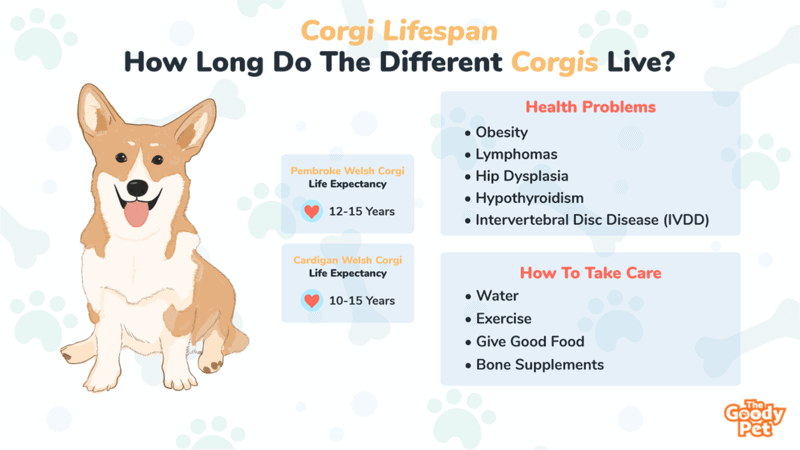It took me a while to get onto the Corgi bandwagon, but since I joined cohorts with the Queen of England, I have never looked back. There is nothing not to love about these dogs, from their aesthetics to their temperament. So how long do you have to enjoy time with your pooch?
Corgis, in general, have an average lifespan of 12 to 15 years. They live relatively healthy lives, with most of their terminal illnesses being related primarily to age. However, there are a number of health issues from as early as puppy years that affect the quality of life and may even shave years off a Corgi’s expected lifespan.
In the sections below, we shall take an in-depth look at health issues in Corgis and how to minimize their risks through adequate care. But first, let us compare the two types of Corgis to see whether they both have the same life expectancy.
How Long Do Corgis Live?

A Pembroke Welsh Corgi can live for 12 to 15 years or even more when well taken care of and if they do not inherit any life-threatening diseases. For some perspective, this means that a Corgi can live for about 64 to 76 in human years for the small breed doggy and is one of the highest ranges for dogs in general.
Despite being so similar in many different aspects, a Pembroke Welsh Corgi will more often than not outlive a Cardigan Corgi.
The Cardigan Welsh Corgis have a life span of 10 to 15 years. In human years, this translates to 56 to 76 years.
What about mixed breed dogs with Corgis as one of the contributing breeds? For the most part, mixed Corgis rarely live longer than their parents unless there is a huge gap in terms of life expectancy between the two breeds.
In the case of Corgis, if you mixed it with a breed like the Bernese Mountain Dog, which has the shortest lifespan of about seven years, the resulting mixed doggy will live for much shorter than they would if they were pure Corgi.
However, this is not always the case. In fact, with dogs that are almost similar in terms of life expectancy, they may end up living longer than the Corgi or the other breed contributing to the mix. A fantastic example here is that of a mix between a Corgi and Chihuahua mix which can live for up to 16 years or even more.
Do Corgis Have A Lot Of Health Problems?

When it comes to health issues, Corgis are relatively low maintenance. However, this does not mean that you get to enjoy smooth sailing when raising one. We have compiled a list of some of the most important health issues you may encounter so that you know what you are getting yourself into.
Intervertebral Disc Disease (IVDD)
This condition affects the structure and functioning of the cartilaginous discs between the vertebrae in the dog’s backbone. For Corgis, intervertebral disc disease starts as early as adolescent years and progressively worsens, causing issues like chronic pain and muscle spasms to paralysis.
Hip Dysplasia
Hip dysplasia is associated with chondrodysplastic dwarf breeds like Corgis. It results in abnormal formation of the hip and shoulder sockets and therefore destabilizes the joint. This further puts the Corgi at risk of developing arthritis later on in its life.
Obesity
With their massive appetites and all these mobility-related health issues, Corgis are at a very high risk of developing obesity. This leads to further life-threatening complications, including diabetes and heart disease.
Lymphomas
Corgis are more prone to developing lymphomas than many other dog breeds. This form of blood cancer, unfortunately, does not get symptomatic until it starts to spread to nearby organs. However, if you notice any unusual nodes under the skin, they are definitely worth checking out with a vet near you.
Hypothyroidism
With hypothyroidism, the thyroid gland in the Corgi does not produce enough thyroid hormone levels to meet the body’s demands. This leads to complications, including cold intolerance, weight gain, and alopecia.
What Can I Give My Corgis For Their Health Problems?
A vet visit is the best thing you could do for a sick Corgi, no matter what it is suffering from. However, this does not mean that, as the dog parent, there is nothing that you can do to help alleviate your fur baby’s suffering.
Here are a few things that could come in handy with some of the health issues we mentioned earlier and other rare ones that plague them.
High-Protein, Low-Carb Diet
As far as Corgi’s health is concerned, food can make or break everything. Try and go for something that is low in carbohydrates to help them lose any extra weight. Proteins, on the other hand, should be in high quantity and proportion to help build muscles that then support the weak skeletal system.
Joint And Bone Supplements

Anything with glucosamine, chondroitin, hyaluronic acid, and MSM should do the trick. These serve different purposes in the skeletal system, from promoting healing to increasing lubrication.
It will help put your Corgi out of a lot of pain from issues like hip dysplasia and IVDD. These are usually conveniently in the form of soft chew treats, which you can easily incorporate into the sick dog’s routine.
Water
Water, quite frankly, will solve a lot of your Corgi’s health issues. It comes in particularly handy with digestive issues like constipation by promoting digestion and passage of the food along the gut. It also helps with dehydration issues like dry skin and poor temperature regulation.
How To Take Preventive Care Of Corgis And Reduce Health Problems?
It is one thing to take care of a sick Corgi and another to prevent the illness in the first place.
While some illnesses, like lymphomas and other age-related diseases, are more or less inevitable, there are many with preventative measures. Here are four of them and what they will do for your furry best buddy.
Watch How Much They Eat
Corgis are very ravenous and, if left to their own devices, would probably eat all day every day. In order to prevent issues such as obesity, diabetes, and heart disease, it is very important to control their portions appropriately.
For adult Corgis, ½ to ¾ of a cup of dog food per day should be enough.
Feed Them Only The Best
In addition to the quantity, make sure to only give your Corgi high-quality dog food. One of the best options on the market right now is Pet Plate.
This brand offers high-quality meals from real human-grade ingredients specially formulated for all-rounded dog health. Its meals also come with beneficial supplements, such as salmon oil and taurine, that help boost the immunity system to lower the risk of falling sick.
Make Exercise A Priority
Corgis are not lazy, but they can get comfortable with minimum activity.
Do not allow this to happen if you do not want to end up with an overweight and sickly doggy.
Try carving out 30 to 60 minutes every day for not less than five days a week for playtime with your pooch.
Do Not Skip Vet Visits
This will help you keep up with vaccinations to prevent common infectious diseases that may affect the Corgi. It also allows for regular checkups so that any serious illness can be caught early and managed appropriately.
What Do Corgis Usually Die From?
The majority of the health issues we looked at previously are, for the most part, non-fatal. So what do Corgis die from?
Here are the five leading causes of death for the breed.
Cancer
One of the most common types here is lymphoma. Others include tumors of the reproductive tract, digestive tract, and skin cancers.
Without regular checkups, these are usually caught late and cause death when they spread to vital organs like the brain, liver, and lungs.
Kidney Failure
As Corgis grow older, they are more prone to developing urinary obstruction. If not fixed promptly, this could lead to renal failure as a result of urinary retention.
Something interesting about this is that it has been shown to be more prevalent in Cardigan Corgis than the Pembroke variety.
Complications Of Obesity
The ones of greatest consequence here are heart failure and diabetes. This, unfortunately, can affect the Corgi at any age as long as they are overweight and no steps are taken to get them back to healthy ranges.
Neurologic Complications
One of the biggest issues here is paralysis due to intervertebral disc disease.
This results in a number of complications, including bowel and bladder incontinence as well as infections from sores which could all end in life-threatening states.
Old Age
Sometimes it is hard to put the finger on exactly what it was that killed the Corgi. This happens a lot when they are around 14 to 15 years of age and can actually only be defined as death due to old age.
Related Questions
How Do You Punish A Corgi? It is never a good idea to punish a Corgi. They are generally very sensitive dogs, and you might end up traumatizing them. Instead, focus your efforts more on reinforcing good behavior. These doggies are very intelligent, and they love to please. So with consistency and patience, you can get them to do whatever you want.
How Many Miles Can A Corgi Run? Due to their build and several skeletal issues, Corgis are certainly not the most athletic dog breed. They do not often run, and when they do, the Corgi will probably only run a mile or less before stopping. However, they love to walk, and a fit Corgi can walk up to 8 miles at a moderate pace.
How Much Do Corgis Sleep? A Corgi can sleep for as much as 12 to 14 hours per day like adults. They can sleep a lot more than this as young puppies averaging about 18 hours a day. They can, however, also have sleep problems, especially if they suffer from anxiety and phobias, in which case you will have to work intentionally to develop a healthy sleep routine for them.





